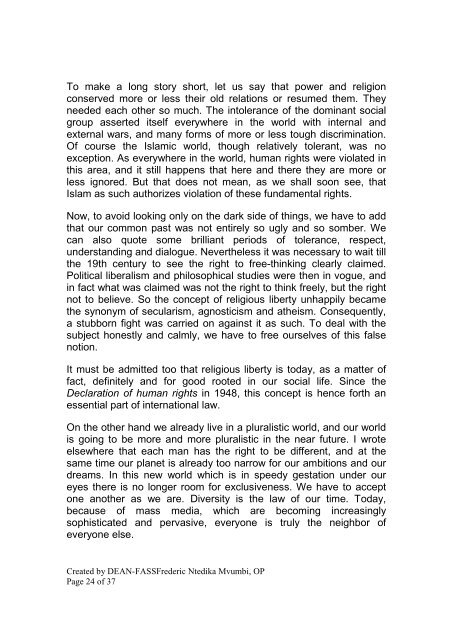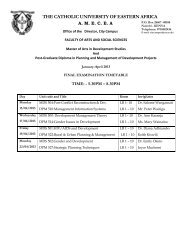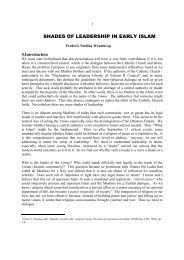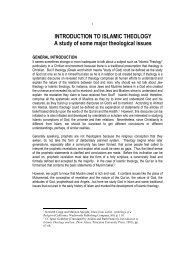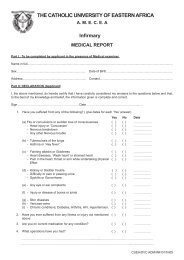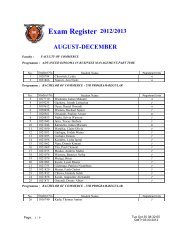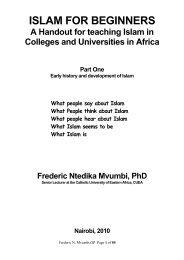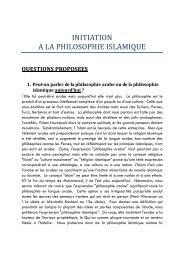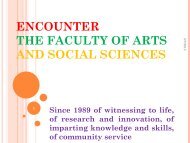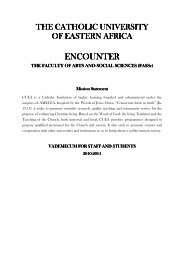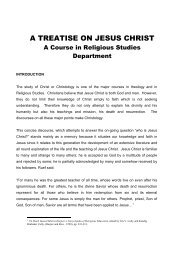PRINCIPLES FOR INTERRELIGIOUS DIALOGUE.pdf - CUEA
PRINCIPLES FOR INTERRELIGIOUS DIALOGUE.pdf - CUEA
PRINCIPLES FOR INTERRELIGIOUS DIALOGUE.pdf - CUEA
Create successful ePaper yourself
Turn your PDF publications into a flip-book with our unique Google optimized e-Paper software.
To make a long story short, let us say that power and religion<br />
conserved more or less their old relations or resumed them. They<br />
needed each other so much. The intolerance of the dominant social<br />
group asserted itself everywhere in the world with internal and<br />
external wars, and many forms of more or less tough discrimination.<br />
Of course the Islamic world, though relatively tolerant, was no<br />
exception. As everywhere in the world, human rights were violated in<br />
this area, and it still happens that here and there they are more or<br />
less ignored. But that does not mean, as we shall soon see, that<br />
Islam as such authorizes violation of these fundamental rights.<br />
Now, to avoid looking only on the dark side of things, we have to add<br />
that our common past was not entirely so ugly and so somber. We<br />
can also quote some brilliant periods of tolerance, respect,<br />
understanding and dialogue. Nevertheless it was necessary to wait till<br />
the 19th century to see the right to free-thinking clearly claimed.<br />
Political liberalism and philosophical studies were then in vogue, and<br />
in fact what was claimed was not the right to think freely, but the right<br />
not to believe. So the concept of religious liberty unhappily became<br />
the synonym of secularism, agnosticism and atheism. Consequently,<br />
a stubborn fight was carried on against it as such. To deal with the<br />
subject honestly and calmly, we have to free ourselves of this false<br />
notion.<br />
It must be admitted too that religious liberty is today, as a matter of<br />
fact, definitely and for good rooted in our social life. Since the<br />
Declaration of human rights in 1948, this concept is hence forth an<br />
essential part of international law.<br />
On the other hand we already live in a pluralistic world, and our world<br />
is going to be more and more pluralistic in the near future. I wrote<br />
elsewhere that each man has the right to be different, and at the<br />
same time our planet is already too narrow for our ambitions and our<br />
dreams. In this new world which is in speedy gestation under our<br />
eyes there is no longer room for exclusiveness. We have to accept<br />
one another as we are. Diversity is the law of our time. Today,<br />
because of mass media, which are becoming increasingly<br />
sophisticated and pervasive, everyone is truly the neighbor of<br />
everyone else.<br />
Created by DEAN-FASSFrederic Ntedika Mvumbi, OP<br />
Page 24 of 37


